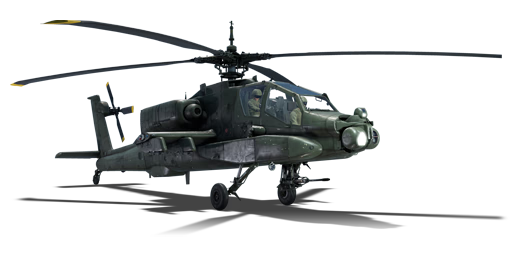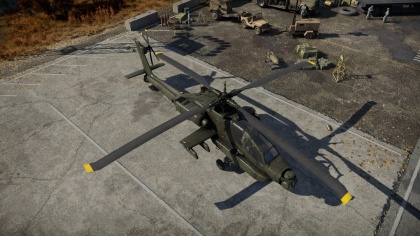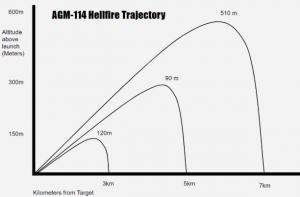Difference between revisions of "AH-64A"
(→External links: Added manufacturer) |
(→Usage in battles) (Tag: Visual edit) |
||
| Line 49: | Line 49: | ||
== Usage in battles == | == Usage in battles == | ||
| − | ''Describe the tactics of playing in a helicopter, the features of using helicopter in a team and advice on tactics. Refrain from creating a "guide" - do not impose a single point of view, but instead, give the reader food for thought. Examine the most dangerous enemies and give recommendations on fighting them. If necessary, note the specifics of the game in different modes (AB, RB, SB).'' | + | ''<!--Describe the tactics of playing in a helicopter, the features of using helicopter in a team and advice on tactics. Refrain from creating a "guide" - do not impose a single point of view, but instead, give the reader food for thought. Examine the most dangerous enemies and give recommendations on fighting them. If necessary, note the specifics of the game in different modes (AB, RB, SB).-->'' |
| + | |||
| + | '''Overview:''' | ||
| + | |||
| + | The AH.64A is an excellent helicopter for attacking ground targets, and can also hold its own against many enemy aircraft. Through adequate use of cover, teamwork, and game sense, the Apache can easily dismantle enemy teams. An Apache pilot must understand all of the tools at their disposal. | ||
| + | |||
| + | The Apache has an arsenal of weapons. The most effective anti-tank weapon in the Apache’s arsenal is the AGM114 Hellfire, which uses a top attack trajectory to destroy ground vehicles. There is functionally very little difference between the AGM114B and K variants, used on early and late Apaches respectively. | ||
| + | |||
| + | '''Staying Alive:''' | ||
| + | |||
| + | Flying the Apache effectively can be more difficult than most players would imagine. Trying to deal with threats from enemy air and ground vehicles while continuing to attack the enemy team can be difficult. If distracted, a pilot can quickly lose situational awareness. Being successful in the Apache requires above all else situational awareness. Due to the fragility of the helicopter, any blindspot can lead to a quick and sudden death. Additionally, the mobility of the Apache is adequate but not impressive, so evasive maneuvers are not always effective. | ||
| + | |||
| + | Using cover is a very important part of staying alive in the Apache. Always stay behind a hill or building in ground battles. When exposing yourself in order to fire on the enemy, be mindful to not gain too much altitude. Most importantly, ''Always listen to your RWR. ''If you hear an alarm, take evasive action immediately. | ||
| + | |||
| + | Additionally, it is important to know when to use flares. Flares are extremely effective against heat-seeking missiles, but useless against any other missiles. It is the responsibility of the Apache pilot to recognize the threat and decide whether to use flares or not. | ||
| + | |||
| + | '''Air to Air (Heatseekers and Gun):''' | ||
| + | |||
| + | The Apache is surprisingly potent in air to air combat. Engagements should be conducted primarily through the use of the stinger or Aim-9L missiles. | ||
| + | |||
| + | The stinger is a simple but effective air to air missile. It has an excellent seeker head and can obtain all aspect lock on almost any air target within 3-5km (even propellor aircraft with a low heat signature). However, the stinger can be easily fooled by flares or outmaneuvered by a fast enemy aircraft. The best way to use the stinger against enemy aircraft is when they are heading directly towards you. If fired at the right second, most enemies will struggle to dodge a stinger. | ||
| + | |||
| + | The Aim-9L is another great choice for shooting enemy aircraft. The Aim-9L is larger, faster, and more maneuverable. Additionally, the Aim-9L is more resistant to flares and countermeasures than the stinger. The issue with this missile is the fact that it must be taken instead of other ordinances while the stingers are carried on the side of the pylons. | ||
| + | |||
| + | If the enemy gets close, the 30mm autocannon can be extremely effective. The gun will automatically aim with optical lock, so Apache pilots can aim accurately while taking evasive maneuvers. | ||
| + | |||
| + | '''Close Range Air to Ground (Gun and Rockets):''' | ||
| + | |||
| + | At close range, the Apache has excellent offensive capability. The 30mm autocannon is incredibly accurate even at surprisingly far distances. This cannon uses a High Explosive Dual Purpose round that can engage lightly armored targets. Rocket pods can also be used, with the CCIP computer helping maintain accuracy even at further distances. Be careful when trying to use the Hellfire missile at close range. It can do a direct attack at closer ranges (rather than it’s usual top attack) but if fired at an odd angle, it may not have time to maneuver onto the target if fired at closer ranges. | ||
| + | |||
| + | The problem with trying to engage at close range is that doing so will put the Apache in huge amounts of danger. Enemy tanks will be able to quickly destroy the Apache with their main guns or anti-aircraft machineguns. | ||
| + | |||
| + | '''Long Range Air to Ground (Hellfire): ''' | ||
| + | [[File:HellfireSequenceDemonstration.mp4|left|thumb]] | ||
| + | [[File:HellfireTrajectory.png|thumb]] | ||
| + | At longer ranges, the Hellfire missile can be used to full effect. The hellfire will guide on its target as shown in the attached diagram. This is known as top attack. Being that it takes this path to the enemy target, the hellfire can take upward of 30 seconds to reach its target at longer ranges. Do not fire at enemies that are about to move to cover, and make sure to fire multiple missiles at once in order to deal maximum damage. Because the hellfire is laser guided, multiple missiles can be fired at once. They should be fired at intervals of 5-10 seconds, where between missiles the Apache can switch to a new ground target. This will allow for the quick destruction of multiple enemies. This tactic can be incredibly effective. Although the time to target for the most recently fired hellfire is available on the HUD, pilots will have to keep track of all the missiles they have fired by memory and quick calculations. | ||
| + | |||
| + | Combatting enemy anti aircraft vehicles can be a challenge. Always remain in cover and move unpredictably in combat. Use the radar warning receiver to obtain the general direction of enemy AA, and then attack with a Hellfire. An effective strategy is to fire a hellfire, break optical lock to gain cover and avoid counterfire, and then pop back up and get lock again several seconds before the Hellfire hits. This strategy if applied correctly will result in a hit, as the Hellfire is smart enough to begin following the laser designator again once the Apache re-obtains its lock. | ||
=== Pros and cons === | === Pros and cons === | ||
Revision as of 08:58, 25 July 2020
Contents
Description
The AH-64A is a rank American attack helicopter
with a battle rating of (AB), (RB), and (SB). It was introduced in Update 1.97 "Viking Fury".
General info
Flight performance
Describe how the helicopter behaves in the air. Speed, manoeuvrability, acceleration and allowable loads - these are the most important characteristics of the vehicle.
| Characteristics | ||
|---|---|---|
| Stock | ||
| Max Speed (km/h at 1,000 m) |
Max altitude (metres) | |
| AB | RB | |
| ___ | ___ | |
| Upgraded | ||
| Max Speed (km/h at 1,000 m) |
Max altitude (metres) | |
| AB | RB | |
| ___ | ___ | |
Survivability and armour
Examine the survivability of the helicopter. Note how vulnerable the structure is and how secure the pilot is, whether the fuel tanks are armoured, etc. Describe the armour, if there is any, and also mention the vulnerability of other critical systems.
Armaments
Offensive armament
Describe the offensive armament of the aircraft, if any. Describe how effective the cannons and machine guns are in a battle, and also what belts or drums are better to use. If there is no offensive weaponry, delete this subsection.
Suspended armament
Describe the aircraft's suspended armament: additional cannons under the wings, bombs, rockets and torpedoes. This section is especially important for bombers and attackers. If there is no suspended weaponry remove this subsection.
Defensive armament
Defensive armament with turret machine guns or cannons, crewed by gunners. Examine the number of gunners and what belts or drums are better to use. If defensive weaponry is not available, remove this subsection.
Usage in battles
'
Overview:
The AH.64A is an excellent helicopter for attacking ground targets, and can also hold its own against many enemy aircraft. Through adequate use of cover, teamwork, and game sense, the Apache can easily dismantle enemy teams. An Apache pilot must understand all of the tools at their disposal.
The Apache has an arsenal of weapons. The most effective anti-tank weapon in the Apache’s arsenal is the AGM114 Hellfire, which uses a top attack trajectory to destroy ground vehicles. There is functionally very little difference between the AGM114B and K variants, used on early and late Apaches respectively.
Staying Alive:
Flying the Apache effectively can be more difficult than most players would imagine. Trying to deal with threats from enemy air and ground vehicles while continuing to attack the enemy team can be difficult. If distracted, a pilot can quickly lose situational awareness. Being successful in the Apache requires above all else situational awareness. Due to the fragility of the helicopter, any blindspot can lead to a quick and sudden death. Additionally, the mobility of the Apache is adequate but not impressive, so evasive maneuvers are not always effective.
Using cover is a very important part of staying alive in the Apache. Always stay behind a hill or building in ground battles. When exposing yourself in order to fire on the enemy, be mindful to not gain too much altitude. Most importantly, Always listen to your RWR. If you hear an alarm, take evasive action immediately.
Additionally, it is important to know when to use flares. Flares are extremely effective against heat-seeking missiles, but useless against any other missiles. It is the responsibility of the Apache pilot to recognize the threat and decide whether to use flares or not.
Air to Air (Heatseekers and Gun):
The Apache is surprisingly potent in air to air combat. Engagements should be conducted primarily through the use of the stinger or Aim-9L missiles.
The stinger is a simple but effective air to air missile. It has an excellent seeker head and can obtain all aspect lock on almost any air target within 3-5km (even propellor aircraft with a low heat signature). However, the stinger can be easily fooled by flares or outmaneuvered by a fast enemy aircraft. The best way to use the stinger against enemy aircraft is when they are heading directly towards you. If fired at the right second, most enemies will struggle to dodge a stinger.
The Aim-9L is another great choice for shooting enemy aircraft. The Aim-9L is larger, faster, and more maneuverable. Additionally, the Aim-9L is more resistant to flares and countermeasures than the stinger. The issue with this missile is the fact that it must be taken instead of other ordinances while the stingers are carried on the side of the pylons.
If the enemy gets close, the 30mm autocannon can be extremely effective. The gun will automatically aim with optical lock, so Apache pilots can aim accurately while taking evasive maneuvers.
Close Range Air to Ground (Gun and Rockets):
At close range, the Apache has excellent offensive capability. The 30mm autocannon is incredibly accurate even at surprisingly far distances. This cannon uses a High Explosive Dual Purpose round that can engage lightly armored targets. Rocket pods can also be used, with the CCIP computer helping maintain accuracy even at further distances. Be careful when trying to use the Hellfire missile at close range. It can do a direct attack at closer ranges (rather than it’s usual top attack) but if fired at an odd angle, it may not have time to maneuver onto the target if fired at closer ranges.
The problem with trying to engage at close range is that doing so will put the Apache in huge amounts of danger. Enemy tanks will be able to quickly destroy the Apache with their main guns or anti-aircraft machineguns.
Long Range Air to Ground (Hellfire):
At longer ranges, the Hellfire missile can be used to full effect. The hellfire will guide on its target as shown in the attached diagram. This is known as top attack. Being that it takes this path to the enemy target, the hellfire can take upward of 30 seconds to reach its target at longer ranges. Do not fire at enemies that are about to move to cover, and make sure to fire multiple missiles at once in order to deal maximum damage. Because the hellfire is laser guided, multiple missiles can be fired at once. They should be fired at intervals of 5-10 seconds, where between missiles the Apache can switch to a new ground target. This will allow for the quick destruction of multiple enemies. This tactic can be incredibly effective. Although the time to target for the most recently fired hellfire is available on the HUD, pilots will have to keep track of all the missiles they have fired by memory and quick calculations.
Combatting enemy anti aircraft vehicles can be a challenge. Always remain in cover and move unpredictably in combat. Use the radar warning receiver to obtain the general direction of enemy AA, and then attack with a Hellfire. An effective strategy is to fire a hellfire, break optical lock to gain cover and avoid counterfire, and then pop back up and get lock again several seconds before the Hellfire hits. This strategy if applied correctly will result in a hit, as the Hellfire is smart enough to begin following the laser designator again once the Apache re-obtains its lock.
Pros and cons
Pros:
- Can bring a huge assortment of payload
Cons:
History
Describe the history of the creation and combat usage of the helicopter in more detail than in the introduction. If the historical reference turns out to be too long, take it to a separate article, taking a link to the article about the vehicle and adding a block "/History" (example: https://wiki.warthunder.com/(Vehicle-name)/History) and add a link to it here using the main template. Be sure to reference text and sources by using <ref></ref>, as well as adding them at the end of the article with <references />. This section may also include the vehicle's dev blog entry (if applicable) and the in-game encyclopedia description (under === In-game description ===, also if applicable).
Media
Excellent additions to the article would be video guides, screenshots from the game, and photos.
See also
Links to the articles on the War Thunder Wiki that you think will be useful for the reader, for example:
- reference to the series of the helicopter;
- links to approximate analogues of other nations and research trees.
External links
| Boeing Aircraft | |
|---|---|
| Aircraft | |
| Fighters | P-26A-33 · P-26A-34 M2 · P-26B-35 |
| Bombers | B-17E · B-17E/L · B-17G-60-VE |
| B-29A-BN | |
| Export | P-26A-34 · B-17G |
| Captured | ▅B-17E |
| Helicopters | |
| Attack | AH-64A · AH-64D |
| Export / Licensed | AH-64A (GR) · ▃AH-64A Peten · AH-64A Peten · ▅AH-64DJP · ▄AH Mk.1 · AHS |
| See Also | Tupolev Design Bureau · Westland Helicopters · Fuji Heavy Industries |
| For Boeing-built ships, see Boeing Marine Branch | |
| USA helicopters | |
|---|---|
| Attack | |
| Black Hawk | MH-60L DAP |
| Choctaw | H-34 |
| Cobra | AH-1F · AH-1G · AH-1Z |
| SuperCobra | AH-1W |
| Kiowa | OH-58D |
| Little Bird | AH-6M |
| Apache | YAH-64 · AH-64A · ▃AH-64A Peten · AH-64A (GR) · AH-64D |
| Utility | |
| Huey | UH-1B · UH-1C · UH-1C XM-30 |






